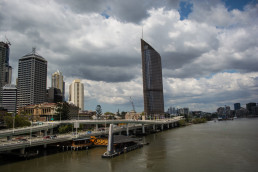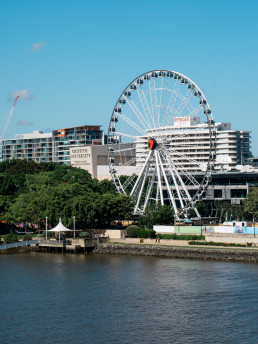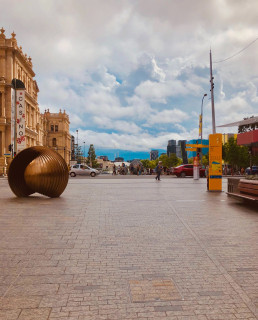Marie's Story
Marie’s Story
Marie had experienced domestic violence for over 15 years and was unaware she was liable for a $60,000 debt. She didn’t know the creditor and suspected the debt was from a contract her ex-partner had entered into. She was also reluctant to provide bank statements to the creditor, as they might disclose her location to her ex-partner.
LawRight’s pro bono duty barrister negotiated with the creditor’s agent to provide redacted statements and appeared in court to explain why Marie wasn’t complying with the court summons. Marie felt relieved and safe.
Copyright © 2023 LawRight, All rights reserved.
Nick's Story
Nick’s Story
Nick is a young man with an intellectual disability who was influenced by an older associate to make a prank call while he was drunk. This led to criminal charges but no conviction was recorded. However, Blue Card Services (BCS) cancelled Nick’s blue card, even after learning that since the charge Nick received an NDIS package which supported him to resist outside influence and that he was not considered a risk to children.
Pro bono volunteer lawyers helped Nick prepare evidence to review the BCS decision at QCAT and Pro bono barrister, Clare O’Connor represented him at a compulsory conference. At the hearing HBA Legal provided full representation pro bono and instructed Christopher Wilson of Counsel.
Copyright © 2023 LawRight, All rights reserved.
Ji-Min's Story
Ji-Min’s Story
The service helped Ji-Min, who hired a car, which was stolen after her locked house was broken into and the car-keys taken. The hire car company started Magistrates Court proceedings for damages, arguing that Ji-Min failed to keep the car locked and the keys secure. She was told “she should have slept with the keys on her” and that if she didn’t propose a payment plan, costs would escalate.
Ji-Min tried to prepare a defence but found the task and process too complicated, so she reached out to LawRight. A pro bono lawyer helped Ji-Min understand the court process and the deficiencies in the statement of claim and assisted her to respond with a settlement offer. This was accepted and the matter was discontinued. This outcome resolved months of stress for Ji-Min and ensured that court resources wouldn’t be wasted.
Copyright © 2023 LawRight, All rights reserved.
Jai's Story
Jai’s Story
Unpaid Wages Leading to Volunteering
Jai wanted to recover four years of unpaid wages from her employer. Staff and pro bono lawyers helped Jai calculate her loss, draft and lodge her claim and prepare all the documents needed at each stage of the proceedings. She was able to settle the dispute at the conciliation conference and move on.
“Time with the legal professionals was invaluable and contributed to the opportunity to win my case and rewrite my history”.
Copyright © 2023 LawRight, All rights reserved.
Joseph's Story
Joseph’s Story
Joseph had a defence to the debt claim brought against him in the Magistrates Court, however he wasn’t made aware of the hearing date and a default judgement was made. When the creditor then petitioned for his bankruptcy, Joseph got advice from our Federal Courts office about how to set aside the default judgement but he was so overwhelmed by his money, personal and health troubles that he delayed taking action and a sequestration order was made. LawRight kept helping Joseph and, together with our Magistrates Court pilot service, he prepared evidence of his defence to the default judgement and the sequestration order was overturned on review.
Copyright © 2023 LawRight, All rights reserved.
Karen's Story
Karen’s Story
Over several years, LawRight staff built trust and worked together to achieve a rare Forensic Order revocation. Karen is in her 70s and experiences high levels of anxiety about any changes in her life. Many years ago, during a relapse of her schizophrenia, she committed a minor property crime, and reacted to police who sought to detain her – due to her illness, she believed that they were trying to kidnap her. This resulted in assault and weapons charges and ultimately a Forensic Order.
Karen has lived a very quiet life since and cooperated with her treating team but it has been challenging to move her off the Order as she is too anxious to attend Tribunal hearings and does not want to talk to staff for longer than 10 minutes at a time. However, when Karen realized that a Forensic Order will stop her getting her preferred support and aged care help as she gets older, she knew she could trust us and decided to try for a revocation for the first time in years.
This result is particularly significant because the clinical evidence, client presentation and resistance from the Attorney-General have remained similar for some years. LawRight’s advocacy and legal argument ultimately made the difference.
Copyright © 2023 LawRight, All rights reserved.
Julie's Story
Julies’s Story
Julie still suffers from paranoid delusions which are exacerbated by her active ICE addiction but wanted to move on with her life. Placed on a Forensic Order while judged temporarily unfit for trial, Julie was stuck where she had few friends or family.
Julie wanted to move towns and jobs but felt unable to make any permanent decisions, as at any time, she could be found fit for trial and potentially sent to jail. Julie was sick of living in limbo and wanted to get her court matters dealt with, even if she ended up with a jail sentence. LawRight concluded she met the Presser criteria for fitness for trial despite some ongoing psychotic symptoms and drug use and had capacity to instruct us. We were successful in having Julie found fit for trial. Julie’s Forensic Order will be automatically revoked when she appears in court to have her charges dealt with. Julie told us she was grateful for our assistance as she had previously had negative experiences with lawyers.
Copyright © 2023 LawRight, All rights reserved.
Siti's Story
Siti’s Story
Siti migrated to Australia with her husband and children in 2009. She and her children were victims of domestic violence by her husband, and the children were removed from the parents’ care as a result. Siti needed a blue card to complete the placement component of her studies in education, and to apply for related jobs. Blue Card Services issued a negative notice based on their concerns about her interactions with Child Safety and her criminal history, which included a charge for assault occasioning bodily harm due to physically disciplining her child in 2014. LawRight helped Siti apply to reverse Blue Card Services’s decision and pro bono lawyers supported Siti to represent herself at the final hearing. QCAT set aside the decision to issue a negative notice, and when Siti applied to Blue Card again, she was issued with a positive notice. Siti said LawRight helped her in many more ways than just getting a blue card – she said she is now more confident, that the process helped her learn about herself and that she can now competently use a computer.
“Please forward my thanks and gratitude to the last [volunteer lawyer]. He really motivated me and his explanation was so clear and easy to follow when he was explaining to me on how to draft My Outline of Argument because at that time my mind is too condensed to receive further new information. He make it easy for me to understand by breaking it down the context.”
Copyright © 2023 LawRight, All rights reserved.
Jacqui's Story
Jacqui’s Story
Jacqui is a university social work student who is rebuilding her life, despite many challenges. Her parents severely abused her as a child and in a common manifestaion of trauma, later partnered with a violent abuser. During that relationship she committed property crimes and was imprisoned. Following her release, Jacqui began to rebuild her life by seeing a counsellor to deal with PTSD and depression and enrolling at university. To complete the practical placement for her degree, she required a Blue Card (working with children check).
When Blue Card Services (BCS) rejected Jacqui’s application due to her past criminal history, pro bono volunteers with our QCAT service helped Jacqui apply for review of BCS’ decision. A LawRight member firm and barrister provided ongoing representation to help Jacqui prepare evidence and participate in a compulsory conference. BCS was ordered to reconsider its decision but decided to maintain its refusal. However, six days before the final QCAT hearing, BCS again reconsidered its decision and this time, issued Jacqui with a Blue Card.
This seems a good outcome, but it was 1,007 days from when Jacqui applied for a Blue Card to when she was issued with one – a process that takes most people just a few months. LawRight considers there are structural and individual inequalities in both the extent of these delays and the reasons Blue Card provides for making their decisions.
Copyright © 2023 LawRight, All rights reserved.
Dennis' Story
Dennis’ Story
While Rheumatic Heart Disease (RHD) has been eliminated from most Australian cities, the rates of RHD in Aboriginal and Torres Strait Islander communities are equivalent to developing nations. Comorbidities of chronic health and mental health conditions are common amongst our First Nation clients.
Dennis has acute RHD, as well as a 20-year history of multiple admissions to psychiatric hospitals. Increased support from a medium secure health facility has helped Dennis remain stable for several years, despite significant Sorry Business happening in that time with the loss of both his parents. Dennis was unable to attend either funeral as he was detained in hospital away from his hometown. He has demonstrated considerable will power to recently overcome drug addictions that started as a teenager.
LawRight has supported Dennis through several hearings. We helped his treating team convince the Tribunal that Dennis no longer needed an inpatient Forensic Order, despite the intensive support he relies on for his physical and mental health. The crux of our argument rested on section 28 of the Human Rights Act 2019. We argued that continuing to be held as an inpatient in a large city away from his country and community was an unreasonable restriction of Dennis’s right as an Aboriginal man to maintain his identity, cultural heritage, and kinship ties. The change to community category means that Dennis can move back to his hometown to spend time with his family on Country, which is increasingly important as his life expectancy is now measured in months.
Copyright © 2023 LawRight, All rights reserved.









